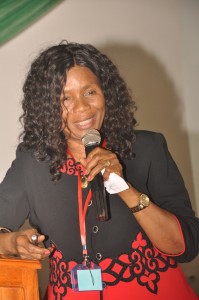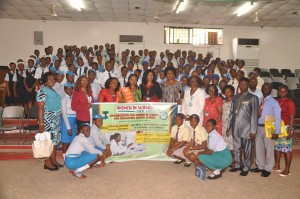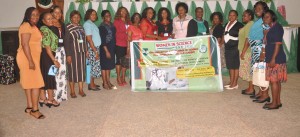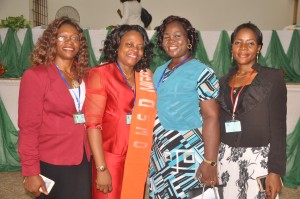Communiqué of the 1st Annual General Meeting and Scientific Conference of the Organization of Women in Science for Developing World, University of Nigeria, Nsukka Chapter, from 29th May – 1st June 2017
1.0. PREAMBLE:
The 1st annual general meeting and scientific conference of the Organization of Women in Science for the Developing World, University of Nigeria Nsukka Chapter (OWSD-UNN), with the theme, “the Impact of Women in Science in National Development’’ held in Princess Alexandra auditorium, University of Nigeria Nsukka.
The meeting/conference drew more than 200 female participants from other universities, academic institutes, and schools which comprised of academics, researchers, postgraduate students and secondary schools students.
2.0. CONFERENCE OBJECTIVES
– Sensitization of the girl child in Science and Technology Education.
– The role of government in enlightenment and sustainability of women in Science and
Technology.
– Publication of book of abstracts and proceedings.
– Strengthening and encouraging networking.
3.0. THE OPENING CEREMONY
The opening ceremony was chaired by Prof. (Mrs) R. U. Osuji of the department of Physics and Astronomy, University of Nigeria, Nsukka. A welcome address was delivered by the Vice Chancellor, University of Nigeria, and the Chief Host – Prof. Benjamin C. Osumba, who was represented by the Vice Chancellor Administration in the person of Prof. C.A. Igwe. The opening addresses were given by the Chairperson of the ceremony (Prof. Mrs. R. U. Osuji), and the Chairperson of OWSD-UNN Chapter (Prof. Mrs. Ngozi J.Nwodo). A goodwill message was delivered by the National Chairperson of OWSD – Prof. (Mrs) Eno E. Ituen, represented by Dr. (Mrs) Esther Harrison.
The keynote lecture titled “Factors limiting the Participation of women in Science’’ was delivered by Prof. (Mrs) F. N. Okeke after Dr. C. N. Ibeto read her citation. Also, three plenary lectures were delivered. The first, was delivered by Prof. (Mrs.) Nkadi Onyegegbu on “Menstrual Hygiene Management among School girls and young women”. The second plenary lecture titled “Women and Health care delivery’’ was delivered by Pharm. (Mrs) Chinenye Onodugo and then the third on “Food security and climate change in Nigeria” was delivered by Dr. Anselm Enete.
There was an award ceremony to recognize seven Women in academics that have shown excellence in their different fields of endeavour. These women include: Prof. (Mrs) Francisca Okeke, Prof. (Mrs) Rose Osuji, Prof. (Mrs) Nkadi Onyegegbu, Prof. (Mrs) Appolonia Nwosu, Prof. (Mrs) Chinwe Ezeani, Pharm. (Mrs) Chinelo Ozumba and Prof. (Mrs) Patience Osadebe. They were all given award plaques after their citations were read e.g the citation of Prof. (Mrs) Appolonia Nwosu was read by Dr. (Mrs) Modesta Ezema.
The vote of thanks was given by Dr. (Mrs) Chioma Anosike, the Acting Chairperson of the Local Organizing Committee of the meeting/conference.
4.0. TECHNICAL SESSION AND DISCUSSIONS
The scientific conference featured four (4) technical sessions with about sixty six (66) paper presentations. The key areas of discussion comprised:
- Basic and applied research
– Physics, Mathematics and Earth science
– Biology and Chemistry
– Medicine and Health science
– Humanities, education and behavior studies (sensitization of girl child to study
Science and Technology)
– Social science
– Biotechnology and Agricultural science
– Engineering
- Climate change adaptation “the role of the women”
- Women and health care delivery
- Women in sustainability and food security in Nigeria “A case study”
5.0. OBSERVATIONS:
- The rate at which the society recognizes the general impact of women is on a decline, despite their contributions to population and most importantly, National development.
- Statistics have shown that females perform better academically than their male counterparts. Even in the hospital, they are known to apply psychotherapy to their patients more than the men.
- Sensitization of women on right nutrition will go a long way in cubing poor nutrition related diseases in families and the society at large.
- A woman’s life style is a determining factor to know whether she will be less obese at old age or not.
- A study conducted has shown that the poor are more vulnerable to adverse effects of climate change.
- A study conducted has shown that carbon (iv) oxide emission level at Okigwe is higher than the normal outdoor acceptable level which results to an increase in ambient air temperature and has detrimental health effects on the inhabitants.
- An investigation on the radioactive forcing by carbon (iv) oxide and methane in China has revealed a significant contribution of China to global warming with respect to atmospheric green house gases.
- A study on the role of women in climate change adaptation in rural farming house-holds advocates that organizations like Women in Science through extension services could communicate information that would help women in rural farming.
- A study on the effects of solar activity on geomagnetic field component has shown that solar activity affects earth’s magnetic field.
- Any education given to a girl child is given to the entire society.
6.0. RECOMMENDATIONS AND FOLLOW-UP ACTIONS
- Adequate representation of women in science, technology, engineering and mathematics (STEM) should be encouraged through scholarships and empowerment programs.
- The “capture them young“ strategies should be adopted and with the use of technology based tools, in gaining more girls into STEM subjects.
- Adequate measures should be put in place to reduce the effects of climate change.
- Based on some studies on the semiconductor thin film materials, there should be a mix of renewable and more sustainable energy with fossil fuel as to meet up with the energy challenge of the nation.
- Both local and international networking among the girls/women in STEM should be encouraged as to enable faster enhancement of knowledge and skills.
- Adequate emphasis should be placed on girl child education at all levels.
- Government, academic institutions and schools are encouraged to embrace more enlightenment programs for young girls in schools with regards to STEM.
- Maternal care should not be taken for granted at all levels.
- Policies that will affirm girl child education should be embraced by the government.
Prof (Mrs) Ngozi Nwodo
Chairperson, OWSD-UNN
Pictures of the Conference








